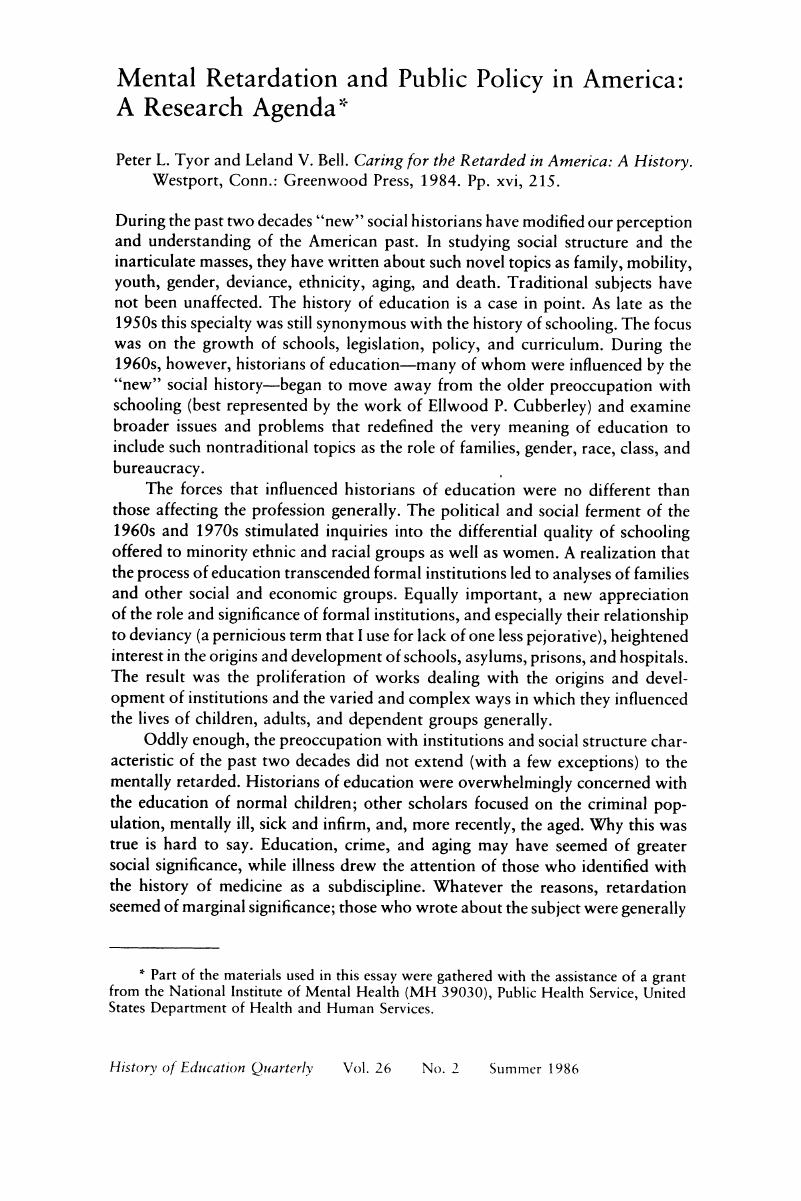Article contents
Mental Retardation and Public Policy in America: A Research Agenda*
Published online by Cambridge University Press: 24 February 2017
Abstract

- Type
- Essay Reviews
- Information
- Copyright
- Copyright © 1986 by the History of Education Society
References
1 Howe, Samuel Gridley, Report Made to the Legislature of Massachusetts, upon Idiocy (Boston, 1848), also printed as Massachusetts Senate Document No. 51 (Feb. 1848).Google Scholar
2 For examples of this theme see Katz, Michael B., Poverty and Policy in American History (New York, 1983); Grob, Gerald N., Mental Illness and American Society, 1875–1940 (Princeton, N.J., 1983); Ravitch, Diane, The Great School Wars, New York City, 1805–1973: A History of the Public Schools as a Battlefield of Social Change (New York, 1974).Google Scholar
3 See Katz, Michael B., “Origins of the Institutional State,” Marxist Perspectives 1 (Winter 1978):6–22; and Scull, Andrew, Decarceration, Community Treatment, and the Deviant: A Radical View (Englewood Cliffs, N.J., 1977).Google Scholar
4 Tomes, Nancy J., A Generous Confidence: Thomas Story Kirkbride and the Art of Asylum Keeping, 1840–1883 (New York, 1984), 108–28; Dwyer, Ellen, “The Asylum and the Community: Commitment Patterns in Two Nineteenth-Century Lunatic Asylums” (Paper presented at the meeting of the Organization of American Historians, Detroit, Michigan, 2 Apr. 1981); Fox, Richard W., So Far Disordered in Mind: Insanity in California, 1870–1930 (Berkeley, Calif., 1978), 84 and passim.Google Scholar
5 For examples of the anti-institutional point of view see David, J. and Rothman, Sheila M., The Willowbrook Wars (New York, 1984); as well as Rothman, David J., The Discovery of the Asylum: Social Order and Disorder in the New Republic (Boston, 1971); and idem, Conscience and Convenience: The Asylum and Its Alternatives in Progressive America (Boston, 1980).Google Scholar
6 For a superb discussion of this theme see Chambers, Clarke A., “New Paths in the Field of Welfare History” (Paper delivered at the Colloquium on Charity and Philanthropy, Princeton University, 16 Mar. 1985).Google Scholar
7 For an insightful analysis of this point see Wahlke, John C., “Policy Demands and System Support: The Role of the Represented,” British Journal of Political Science 1 (July 1971):271–90.Google Scholar
8 Haller, Mark H., Eugenics: Hereditarian Attitudes in American Thought (New Brunswick, N.J., 1963); Pickins, Donald K., Eugenics and the Progressives (Nashville, Tenn., 1968). For a somewhat different emphasis see Vecoli, Rudolph J., “Sterilization: A Progressive Measure?” Wisconsin Magazine of History 43 (Spring 1960): 190–202.Google Scholar
9 “Table of Sterilization… 1940,” mimeograph copy in box 6, folder 56, Association for Voluntary Sterilization Papers, Social Welfare History Archives, University of Minnesota, Minneapolis.Google Scholar
- 1
- Cited by




